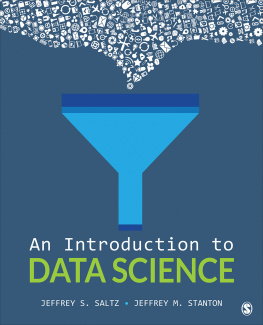Data Science from Scratch
by Joel Grus
Copyright 2015 OReilly Media. All rights reserved.
Printed in the United States of America.
Published by OReilly Media, Inc. , 1005 Gravenstein Highway North, Sebastopol, CA 95472.
OReilly books may be purchased for educational, business, or sales promotional use. Online editions are also available for most titles (http://safaribooksonline.com). For more information, contact our corporate/institutional sales department: 800-998-9938 or corporate@oreilly.com .
- Editor: Marie Beaugureau
- Production Editor: Melanie Yarbrough
- Copyeditor: Nan Reinhardt
- Proofreader: Eileen Cohen
- Indexer: Ellen Troutman-Zaig
- Interior Designer: David Futato
- Cover Designer: Karen Montgomery
- Illustrator: Rebecca Demarest
- April 2015: First Edition
Revision History for the First Edition
- 2015-04-10: First Release
See http://oreilly.com/catalog/errata.csp?isbn=9781491901427 for release details.
The OReilly logo is a registered trademark of OReilly Media, Inc. Data Science from Scratch, the cover image of a Rock Ptarmigan, and related trade dress are trademarks of OReilly Media, Inc.
While the publisher and the author have used good faith efforts to ensure that the information and instructions contained in this work are accurate, the publisher and the author disclaim all responsibility for errors or omissions, including without limitation responsibility for damages resulting from the use of or reliance on this work. Use of the information and instructions contained in this work is at your own risk. If any code samples or other technology this work contains or describes is subject to open source licenses or the intellectual property rights of others, it is your responsibility to ensure that your use thereof complies with such licenses and/or rights.
978-1-491-90142-7
[LSI]
Data Science
Data scientist has been called the sexiest job of the 21st century, presumably by someone who has never visited a fire station. Nonetheless, data science is a hot and growing field, and it doesnt take a great deal of sleuthing to find analysts breathlessly prognosticating that over the next 10 years, well need billions and billions more data scientists than we currently have.
But what is data science? After all, we cant produce data scientists if we dont know what data science is. According to a Venn diagram that is somewhat famous in the industry, data science lies at the intersection of:
- Hacking skills
- Math and statistics knowledge
- Substantive expertise
Although I originally intended to write a book covering all three, I quickly realized that a thorough treatment of substantive expertise would require tens of thousands of pages. At that point, I decided to focus on the first two. My goal is to help you develop the hacking skills that youll need to get started doing data science. And my goal is to help you get comfortable with the mathematics and statistics that are at the core of data science.
This is a somewhat heavy aspiration for a book. The best way to learn hacking skills is by hacking on things. By reading this book, you will get a good understanding of the way I hack on things, which may not necessarily be the best way for you to hack on things. You will get a good understanding of some of the tools I use, which will not necessarily be the best tools for you to use. You will get a good understanding of the way I approach data problems, which may not necessarily be the best way for you to approach data problems. The intent (and the hope) is that my examples will inspire you try things your own way. All the code and data from the book is available onGitHub to get you started.
Similarly, the best way to learn mathematics is by doing mathematics. This is emphatically not a math book, and for the most part, we wont be doing mathematics. However, you cant really do data science without some understanding of probability and statistics and linear algebra. This means that, where appropriate, we will dive into mathematical equations, mathematical intuition, mathematical axioms, and cartoon versions of big mathematical ideas. I hope that you wont be afraid to dive in with me.
Throughout it all, I also hope to give you a sense that playing with data is fun, because, well, playing with data is fun! (Especially compared to some of the alternatives, like tax preparation or coal mining.)
From Scratch
There are lots and lots of data science libraries, frameworks, modules, and toolkits that efficiently implement the most common (as well as the least common) data science algorithms and techniques. If you become a data scientist, you will become intimately familiar with NumPy, with scikit-learn, with pandas, and with a panoply of other libraries. They are great for doing data science. But they are also a good way to start doing data science without actually understanding data science.
In this book, we will be approaching data science from scratch. That means well be building tools and implementing algorithms by hand in order to better understand them. I put a lot of thought into creating implementations and examples that are clear, well-commented, and readable. In most cases, the tools we build will be illuminating but impractical. They will work well on small toy data sets but fall over on web scale ones.
Throughout the book, I will point you to librariesyou might use to apply these techniques to larger data sets.But we wont be using them here.
There is a healthy debate raging over the best language for learning data science. Many people believe its the statistical programming language R. (We call those people wrong.) A few people suggest Java or Scala. However, in my opinion, Python is the obvious choice.
Python has several features that make it well suited for learning (and doing) data science:
- Its free.
- Its relatively simple to code in (and, in particular, to understand).
- It has lots of useful data sciencerelated libraries.
I am hesitant to call Python my favorite programming language. There are other languages I find more pleasant, better-designed, or just more fun to code in. And yet pretty much every time I start a new data science project, I end up using Python. Every time I need to quickly prototype something that just works, I end up using Python. And every time I want to demonstrate data science concepts in a clear, easy-to-understand way, I end up using Python. Accordingly, this book uses Python.
The goal of this book is not to teach you Python. (Although it is nearly certain that by reading this book you will learn some Python.) Ill take you through a chapter-long crash course that highlights the features that are most important for our purposes, but if you know nothing about programming in Python (or about programming at all) then you might want to supplement this book with some sort of Python for Beginners tutorial.
The remainder of our introduction to data science will take this same approach going into detail where going into detail seems crucial or illuminating, at other times leaving details for you to figure out yourself (or look up on Wikipedia).
Over the years, Ive trained a number of data scientists. While not all of them have gone on to become world-changing data ninja rockstars, Ive left them all better data scientists than I found them. And Ive grown to believe that anyone who has some amount of mathematical aptitude and some amount of programming skill has the necessary raw materials to do data science. All she needs is an inquisitive mind, a willingness to work hard, and this book. Hence this book.

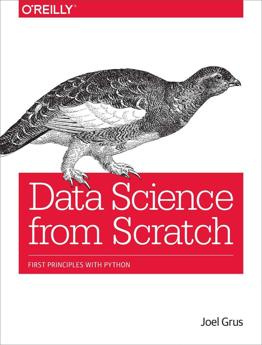
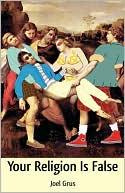
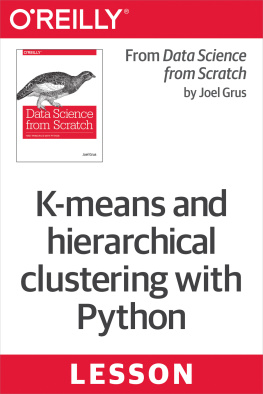
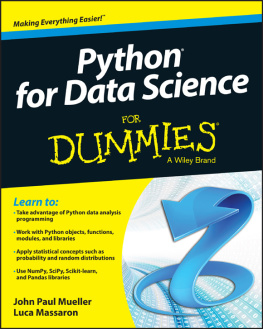
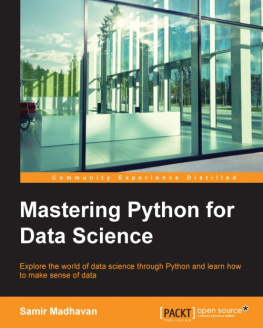
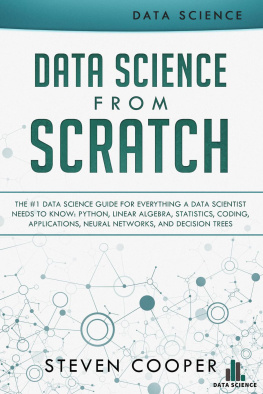
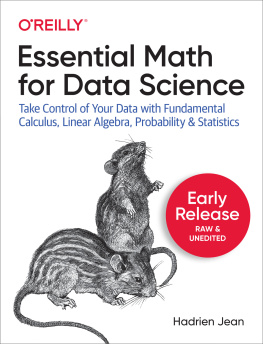
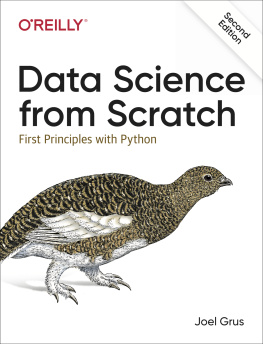
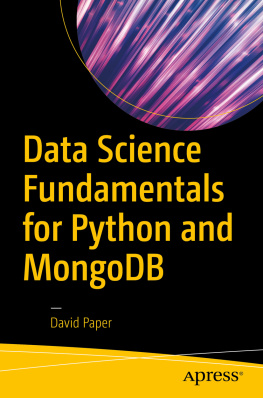
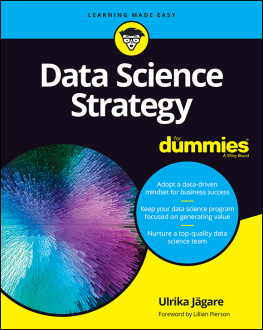
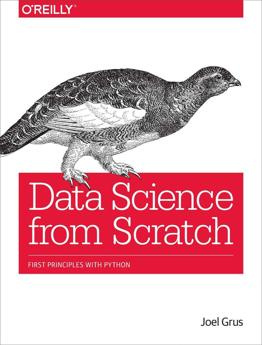
![David Paper [David Paper] - Data Science Fundamentals for Python and MongoDB](/uploads/posts/book/119639/thumbs/david-paper-david-paper-data-science.jpg)
![Michael R. Brzustowicz [Michael R. Brzustowicz] - Data Science with Java](/uploads/posts/book/119626/thumbs/michael-r-brzustowicz-michael-r-brzustowicz.jpg)
